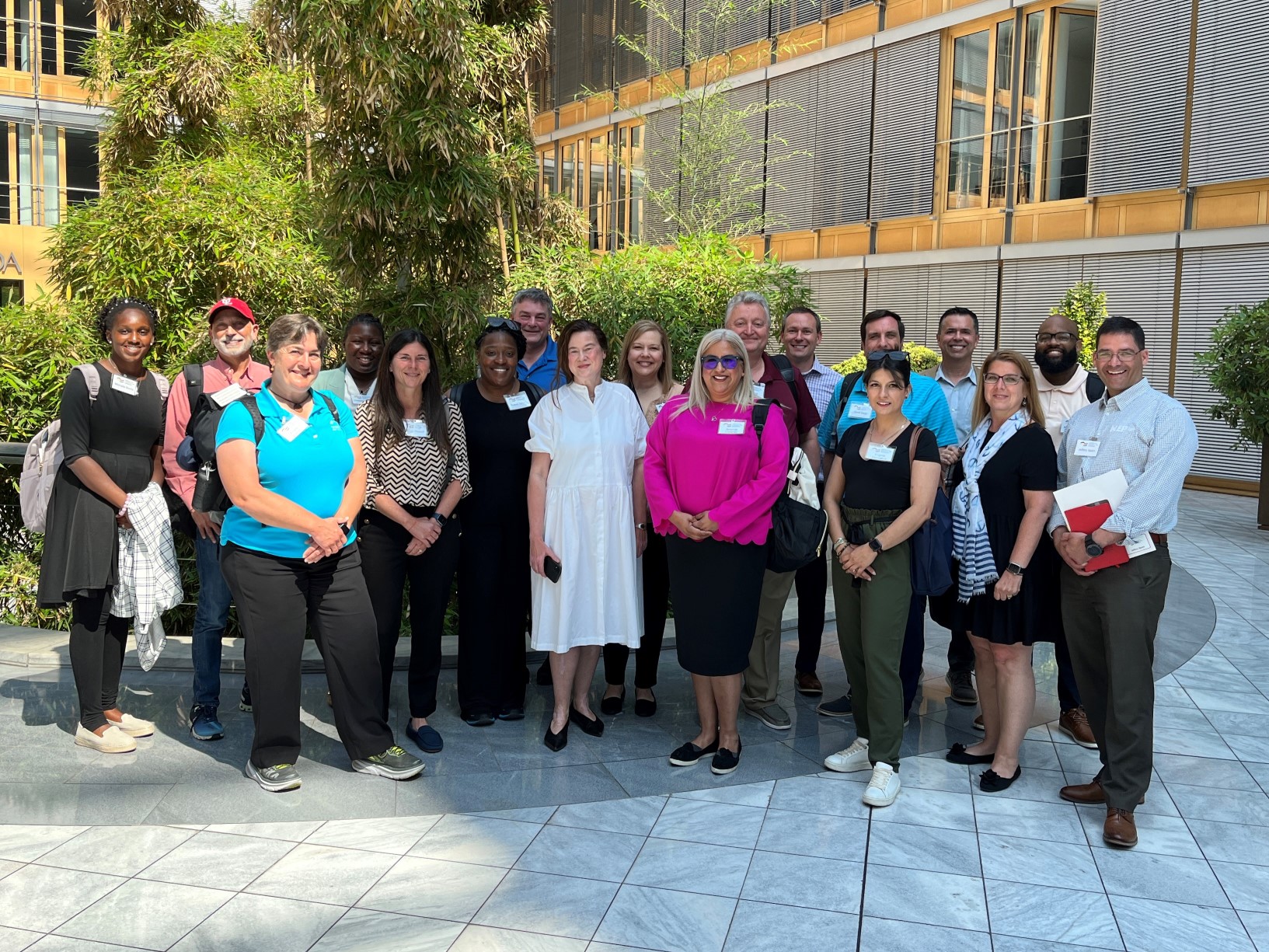
From June 4 to June 10, 2023, an 18-person delegation of Americans visited Berlin, Leipzig, and Magdeburg as part of the America Works series of three Stronger Together Manufacturing Workforce Missions to learn about Germany’s apprenticeship and workforce development system. The participants were from 11 states and represented ten different Manufacturing Extension Partnership (MEP) centers from around the country; they also represented the U.S. Department of Defense Manufacturing Technology Program, the Advanced Manufacturing National Program Office of NIST, and the Century Foundation.
 Beginning in Berlin, the delegation first met with the Confederation of German Employers’ Associations (BDA) for an overview of the German dual system of apprenticeship training, which has approximately 325 standardized training occupations with approximately 1.3 million apprentices annually (500,000 new contracts every year). Employers hire and compensate the apprentices while providing the practical training elements of the curriculum necessary for the examinations and certification at the end of the 2.5-3 years of training. At the German Association for Small and Medium-sized Enterprises (BVMW) the group had a lively discussion about the association’s role in the apprenticeship system with a specific focus on the interests of SMEs (The German Mittelstand) and learned about the association’s “education alliance.” A key takeaway from this meeting was a recognition of the many German “hidden champions” – small companies, often located in rural areas, which produce products and key components used in manufacturing processes invisible to consumers. While unknown to most people, these companies often have world market shares in the range of 70% to 90%, and in the apprenticeship system, they train 82% of the apprentices in Germany. The theoretical portion of the dual apprenticeship training takes place at the vocational schools, which the delegation experienced at the Georg-Schlesinger-Schule – Vocational School for Machine and Production Technology. Apprentices and trainers shared their experiences and provided examples of the projects they work on as part of the training curriculum. Wrapping up the visit to Berlin, the group toured the ABB Training Center, which provides practical training for 750 apprentices in 17 technical dual training professions in metal technology, electrical engineering, and information technology for ABB and 150 other small- and medium-sized companies in Berlin and Brandenburg. ABB offers a special program called girlsatec to encourage more female students for tech-related occupations that offer events like week-long technology camps for students, factory tours, visits for school classes, soldering workshops, and workshops for teachers.
Beginning in Berlin, the delegation first met with the Confederation of German Employers’ Associations (BDA) for an overview of the German dual system of apprenticeship training, which has approximately 325 standardized training occupations with approximately 1.3 million apprentices annually (500,000 new contracts every year). Employers hire and compensate the apprentices while providing the practical training elements of the curriculum necessary for the examinations and certification at the end of the 2.5-3 years of training. At the German Association for Small and Medium-sized Enterprises (BVMW) the group had a lively discussion about the association’s role in the apprenticeship system with a specific focus on the interests of SMEs (The German Mittelstand) and learned about the association’s “education alliance.” A key takeaway from this meeting was a recognition of the many German “hidden champions” – small companies, often located in rural areas, which produce products and key components used in manufacturing processes invisible to consumers. While unknown to most people, these companies often have world market shares in the range of 70% to 90%, and in the apprenticeship system, they train 82% of the apprentices in Germany. The theoretical portion of the dual apprenticeship training takes place at the vocational schools, which the delegation experienced at the Georg-Schlesinger-Schule – Vocational School for Machine and Production Technology. Apprentices and trainers shared their experiences and provided examples of the projects they work on as part of the training curriculum. Wrapping up the visit to Berlin, the group toured the ABB Training Center, which provides practical training for 750 apprentices in 17 technical dual training professions in metal technology, electrical engineering, and information technology for ABB and 150 other small- and medium-sized companies in Berlin and Brandenburg. ABB offers a special program called girlsatec to encourage more female students for tech-related occupations that offer events like week-long technology camps for students, factory tours, visits for school classes, soldering workshops, and workshops for teachers.

The delegation visited four companies in the Leipzig region to gain an understanding of why companies invest in the apprenticeship system and to learn about the challenges and opportunities they face. The CEO of Profiroll Technologies, a German Mittelstand company founded in 1943 with 380 employees, which includes 50 apprentices, explained how critical apprenticeships are for the company to recruit and retain skilled workers. Located in Bad Düben outside of Leipzig, a significant challenge still remains to find young people willing to be outside of the large city. BITZER, another Mittelstand company located near Leipzig that produces air compressors for air conditioning and heat pumps, also stressed the value of using the apprenticeship program to recruit needed future employees. Paying apprentices € 1,000-1,250 per month during their programs and promising almost guaranteed employment upon completion are strong recruitment tools. Contrasting the small companies, the delegation also visited the DHL Hub Leipzig and the BMW Group Plant Leipzig. DHL, with almost 400,000 employees worldwide, attracts apprentices based on the global nature of its business and the opportunity, once hired to work internationally. During the tour at BMW, the delegation spoke with apprentices and trainers in the fields of mechatronics, industrial mechanics, metal processing, and information technology and observed how trainees have workshops but also specific locations in the factory where they perform their practical training. One apprentice, who had completed a six-week exchange with BMW’s plant in Spartanburg, South Carolina, noted that a big difference between the apprenticeship programs in each country is that in Germany trainees rotate through a number of departments to gain experience, rather than just one or two.
 The mission finished the week in Magdeburg with a variety of visits. At the Magdeburg Chamber of Handicrafts’ Training Center the delegation discussed the monitoring role played by the chambers in Germany’s VET system, which includes helping provide training, certifying companies and trainers, and implementing the examinations and awarding certificates to those students who successfully complete their apprenticeship programs. Intel Corporation’s new investment to build a semi-conductor factory will require an expansion of training opportunities in the region. Over dinner with Sandra Yvonne Stieger, Magdeburg’s Deputy Mayor for Economy, Tourism, and Regional Cooperation, members of the delegation had an opportunity to discuss Intel’s impact on the community in-depth and to build the seeds of collaboration between Magdeburg and Columbus, OH, where Intel is also building a new factory. Visits to SCHUBERTH, a German Mittelstand company founded in 1922 that makes helmets for fire departments as well as for Formula 1 racing, and the Magdeburg Transit Authority (Magdeburger Verkehrsbetriebe) provided added insights into the strengths and weakness of the German apprenticeship system. Both companies raised concerns about the basic lack of young people to fill the open job now and in the future, which for the transit authority is critical since almost 50 % of new employees will be needed until 2030 just to maintain the status quo. The program in Magdeburg concluded with a meeting at the Fraunhofer Institute for Factory Operation and Automation which helps small- and medium-sized manufacturers solve the workforce challenges involved in the transition to Industrie 4.0 and even Industrie 5.0. During the visit, the delegation discussed workplace-integrated learning and assistive technologies and toured the institute’s Elbedome, a 360-degree projection system to visualize entire factories and technical facilities or products, and the Elbfabrik, which explores the factory of the future.
The mission finished the week in Magdeburg with a variety of visits. At the Magdeburg Chamber of Handicrafts’ Training Center the delegation discussed the monitoring role played by the chambers in Germany’s VET system, which includes helping provide training, certifying companies and trainers, and implementing the examinations and awarding certificates to those students who successfully complete their apprenticeship programs. Intel Corporation’s new investment to build a semi-conductor factory will require an expansion of training opportunities in the region. Over dinner with Sandra Yvonne Stieger, Magdeburg’s Deputy Mayor for Economy, Tourism, and Regional Cooperation, members of the delegation had an opportunity to discuss Intel’s impact on the community in-depth and to build the seeds of collaboration between Magdeburg and Columbus, OH, where Intel is also building a new factory. Visits to SCHUBERTH, a German Mittelstand company founded in 1922 that makes helmets for fire departments as well as for Formula 1 racing, and the Magdeburg Transit Authority (Magdeburger Verkehrsbetriebe) provided added insights into the strengths and weakness of the German apprenticeship system. Both companies raised concerns about the basic lack of young people to fill the open job now and in the future, which for the transit authority is critical since almost 50 % of new employees will be needed until 2030 just to maintain the status quo. The program in Magdeburg concluded with a meeting at the Fraunhofer Institute for Factory Operation and Automation which helps small- and medium-sized manufacturers solve the workforce challenges involved in the transition to Industrie 4.0 and even Industrie 5.0. During the visit, the delegation discussed workplace-integrated learning and assistive technologies and toured the institute’s Elbedome, a 360-degree projection system to visualize entire factories and technical facilities or products, and the Elbfabrik, which explores the factory of the future.

During the final working session at the Grüne-Zitadelle in Magdeburg, the delegation highlighted themes they wanted to explore further and present to the MEP network in the United States through storytelling and conversations they had with Germans during the week. These themes included:
- Efforts to recruit more females in technical apprenticeships
- Challenges to integrating migrants and immigrants into the apprenticeship system
- Social structures that support the dual system of training
- Outreach and activities to support career exploration for youth at a young age
- Strategies SMEs use in rural areas to promote workforce development
- Adapting technologies and the impact on education and the workplace
In July, members of the delegation will hold a webinar to share their experiences.

 The Stronger Together Manufacturing Workforce Missions are organized and administered by MAGNET: The Manufacturing Advocacy and Growth Network and the American Council on Germany with generous support from the Transatlantic Program of the Government of the Federal Republic of Germany through funds of the European Recovery Program (ERP) of the Federal Ministry of Economic Affairs and Climate Action (BMWK).
The Stronger Together Manufacturing Workforce Missions are organized and administered by MAGNET: The Manufacturing Advocacy and Growth Network and the American Council on Germany with generous support from the Transatlantic Program of the Government of the Federal Republic of Germany through funds of the European Recovery Program (ERP) of the Federal Ministry of Economic Affairs and Climate Action (BMWK).


